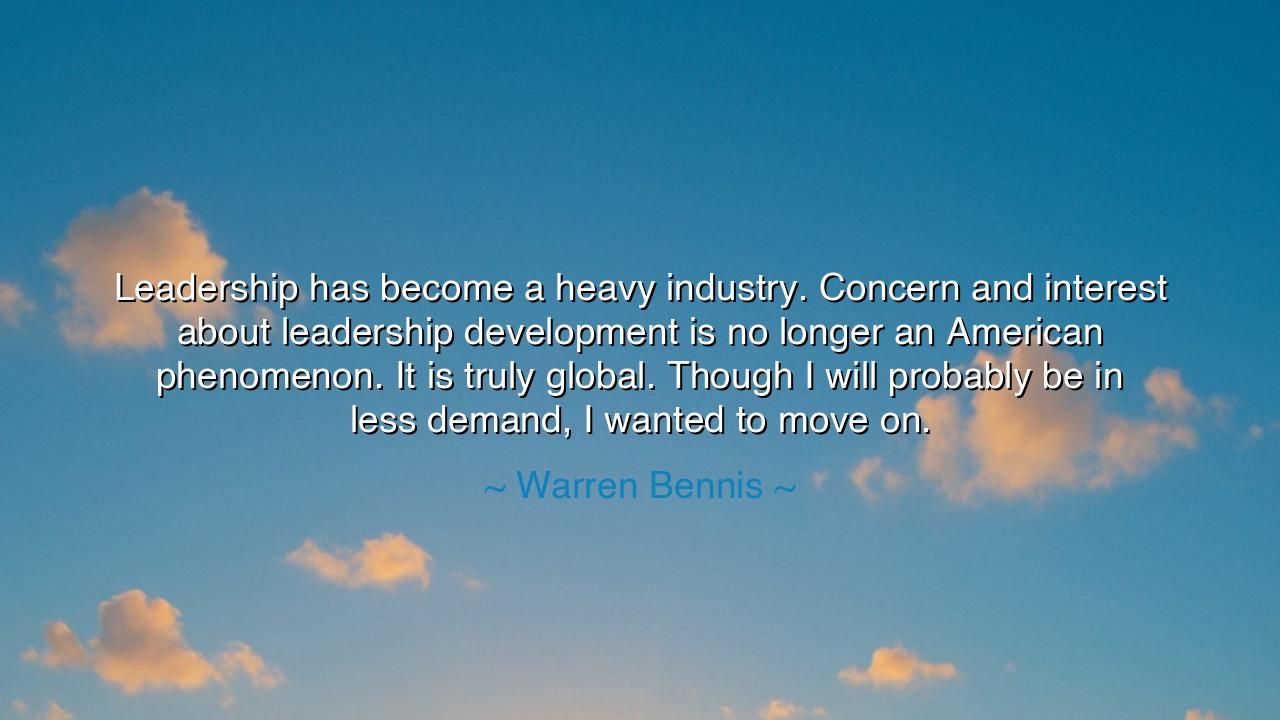
Leadership has become a heavy industry. Concern and interest
Leadership has become a heavy industry. Concern and interest about leadership development is no longer an American phenomenon. It is truly global. Though I will probably be in less demand, I wanted to move on.






In this reflective declaration, Warren Bennis, one of the great architects of modern leadership thought, speaks with the tone of a sage stepping back from the very empire he helped to build. “Leadership has become a heavy industry. Concern and interest about leadership development is no longer an American phenomenon. It is truly global. Though I will probably be in less demand, I wanted to move on.” These words are not the lament of a weary man, but the wisdom of one who has seen an idea grow beyond its maker. Bennis, whose teachings helped shape generations of leaders, recognized that leadership had become something vast — institutionalized, commercialized, and in many places, misunderstood. He speaks not with bitterness, but with clarity, for he knew that when a seed has become a forest, the gardener must learn to let go.
To understand his meaning, we must first remember who Warren Bennis was. In the second half of the twentieth century, as corporations rose and empires of commerce replaced empires of conquest, Bennis became a philosopher of modern leadership. He believed that true leadership was not about command, but about character — not about controlling others, but about knowing oneself. Yet, as time passed, he witnessed the world turn his philosophy into a marketplace. Leadership became an industry — with seminars, certifications, and slogans — and in that transformation, something sacred was lost. The purity of purpose gave way to the machinery of profit. Thus, when Bennis says it had become a “heavy industry,” he is not merely describing a field of study — he is mourning a spirit that had grown burdened by its own ambition.
His insight holds echoes of the ancients. Consider the words of Lao Tzu, who said, “When the best leader’s work is done, the people say, ‘We did it ourselves.’” Lao Tzu too withdrew into the wilderness when his teachings began to harden into systems. Or think of Socrates, who refused to write his lessons, fearing that the written word would fossilize living wisdom into lifeless doctrine. In the same way, Bennis saw the danger of leadership being codified into formulas and trends. For leadership, at its heart, is a living art — born of integrity, empathy, and vision. Once it becomes a product, its soul begins to fade.
When Bennis notes that leadership has become “truly global,” he acknowledges both a triumph and a tragedy. The triumph lies in the awakening of the human spirit — that every culture, every nation, has come to value leadership as essential to progress. The tragedy, however, lies in imitation without reflection. Too many sought to teach leadership without living it. Too many chased influence without purpose. Like the blacksmith’s forge that grows so hot it warps the very metal it was meant to shape, the global obsession with leadership risked bending the concept into something hollow. And so Bennis, seeing the tide he helped raise now rushing in directions he no longer wished to follow, chose to step away — not in defeat, but in grace.
There is a quiet nobility in his final words: “Though I will probably be in less demand, I wanted to move on.” This is the voice of a master who understands the rhythm of creation and release. Just as Marcus Aurelius, emperor and philosopher, knew when to surrender power to principle, so too did Bennis understand that the mark of a true leader is not clinging to relevance, but knowing when to move on. He recognized that leadership is not about being followed, but about inspiring others to walk their own path. By letting go, he lived the very lesson he taught — that leadership is not a possession, but a passage.
The deeper meaning of his statement lies in its humility. Bennis reminds us that even the greatest teacher must beware of becoming a monument to his own ideas. When knowledge becomes institutionalized, it risks losing its heartbeat. The truest wisdom, therefore, lies not in expansion, but in renewal — in the courage to leave behind what has grown too heavy, and to seek the next horizon of truth. Just as a river must leave its source to find the sea, so too must the thinker depart from his own creation to keep it alive in spirit.
From his words, we may draw a lesson for our own lives: that leadership, and indeed all human endeavor, must remain light in the hands and alive in the heart. Do not let your purpose harden into routine; do not let your passion be traded for fame. When your work becomes too heavy, when the world around you begins to worship the shell instead of the soul, have the courage to move on — not out of weariness, but out of wisdom. To lead is to serve, but to move on is to transcend.
And so, let us remember Warren Bennis not as a man who built an industry, but as one who set it free. Let us carry forward his vision of leadership not as power, but as presence — the courage to act with integrity, the grace to step aside when the time comes, and the faith to know that what is true will endure. For the world may build its industries, but wisdom belongs to those who, like Bennis, understand when to walk away — leaving behind not monuments, but living legacies of the soul.






AAdministratorAdministrator
Welcome, honored guests. Please leave a comment, we will respond soon